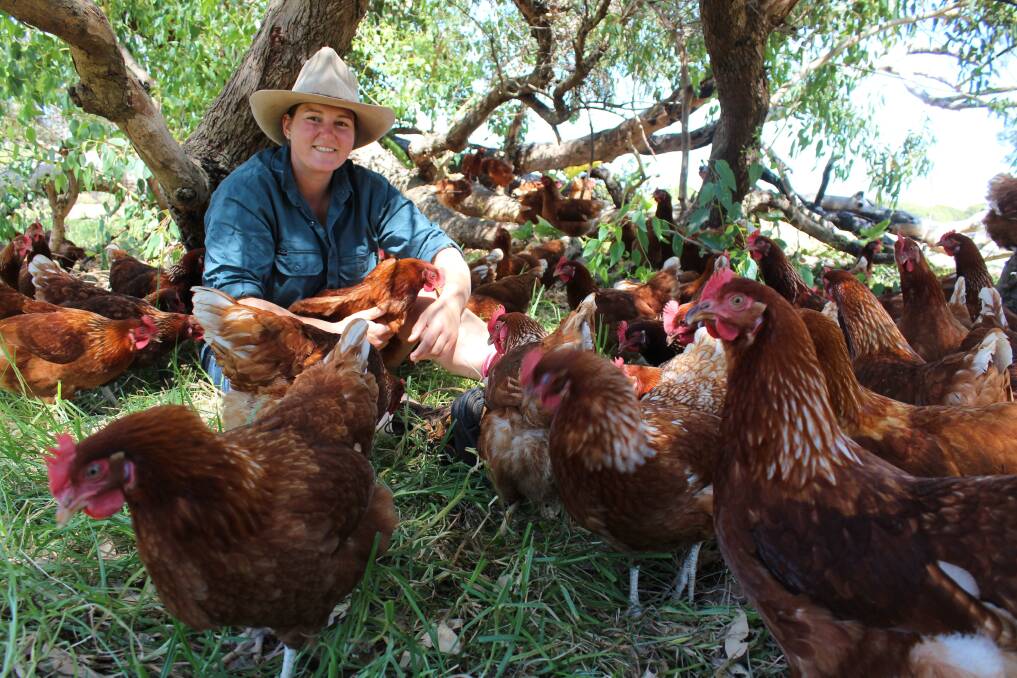
THE humble chicken is set to play a key role in farming operations by rejuvenating and fertilising pastures.
Subscribe now for unlimited access to all our agricultural news
across the nation
or signup to continue reading
Blythe Calnan and partner Gregg, Runnymede Farm, Binningup, are looking to establish a free-range pastured egg farm which would not only fertilise the pastures as part of rotational grazing program with their Shorthorn and Droughtmaster cattle, but also provide the couple with an income source from free-range pastured eggs.
The new enterprise is a far cry from Ms Calnan's background working on stations in the Kimberleys, a stint in mining and pearling, and as a consultant for the live export industry in the Middle East and Russia.
"It has always been on the cards for us as small-scale regenerative agriculture is a passion of ours as we follow people like Joel Salatin (American farmer and lecturer) and the productivity they can get out of small acreage by layering enterprises and the benefits to soil and pasture health and therefore animal health," Ms Calnan said.
"Anyone who is farming livestock is really a grass farmer and anyone farming grass is really a soil farmer - that's what it comes back to."
Beginning the journey as egg farmers and beef producers, the couple purchased the 40 hectare property in Binningup more than two years ago, with an additional 450 hectares of property leased in the area.
After looking at the current competitive cattle market, the couple purchased 300 Shorthorn and Droughtmaster breeders from the Kimberleys, which has been culled down to a herd of 120 breeders.
Last year they made the decision to try their hand at eggs after Ms Calnan's relief milking work at a local dairy dried up.
"At that point I needed to decide whether I went out and got a real job again or whether we looked at stacking some enterprise on our current major asset - being our home block, and starting taking steps towards the long-term goals," she said.
"I never saw myself as a chicken fancier but they are really cool critters."
Initially starting with 200 Hy-line pullets, Ms Calnan plans to increase the flock to 400 pending Shire of Harvey approval (see story opposite page).
The chickens will roam in a 50 metre by 50m electrified fence area and be closely guarded by Bacon, the Maremma sheep dog, rotating across the property for up to a week at a time.
"I think that is the beauty of the chickens, I think they can fit into nearly any system and also for us from a cash flow perspective, they are also something that is readily available and provide that ongoing cash flow.
"Any nutrient you are buying in as feed is then going back onto your property in the form of fertiliser.
"I think it is something that could work in with any farming enterprise."
Ms Calnan said there were no hard or fast rules in how long the chickens or cattle spent on the pasture and it was about observing seasonal conditions and pasture growth.
"Even on a property as small as this we've got different environments, our sandy area is quite a brittle environment so even in winter, where we are growing things on those sand hills, the chickens will need to be moved more regularly to make sure they don't impact it negatively," she said.
"During the growing season when grasses are really growing quickly, the rotation rate increases, so it takes about 21 days to get the cattle around the block.
"In the non-growing season, as things start to slow down, that also slows.
"It is really working with your seasons and keeping flexible depends on how your management goes.
While initially "dubious" of the level of intensity of the enterprise, Ms Calnan said the benefits were already beginning to speak for themselves.
"For us as well it has been more labour intensive but who wouldn't put in the extra work if they couldn't double their stocking density?" she said.
Another benefit from introducing the chickens has been the increased pasture species diversity from their Kikuyu and clover-based pasture.
They have also experimented with cover crops such as rye, oats for grazing and had a go with sorghum and millet for summer and shoulder grazing.
"In areas that have been overgrazed in the past and you're pretty much down to Kikuyu and barley grass we're seeing different perennials come back into our system which weren't evident here when we bought the property," she said.
"We have also had quite a bit of compaction issues in the area and we are noticing in areas where we can get 100 per cent cover for 100pc of the year and extend the season then compaction is also lessening.
"Because we also have a high watertable if we can get well-managed perennials and those roots into the watertable, we will have pumping pasture for most of the year."
In terms of the market for free-range pastured eggs, Ms Calnan predicted demand would outstrip supply with interest from local businesses, as well as Perth and Bunbury.
"We don't ever want to get any bigger than a chicken system which we can manage nutrient-wise and manage with our cattle operation - that multi-species rotation is what is really going to work for us and so we only want to reach a certain size and be paid accordingly.
"By going into something like pastured eggs where people really do appreciate the ethics and welfare systems behind it and having that local food we can actually get fair reward for our hard work."

